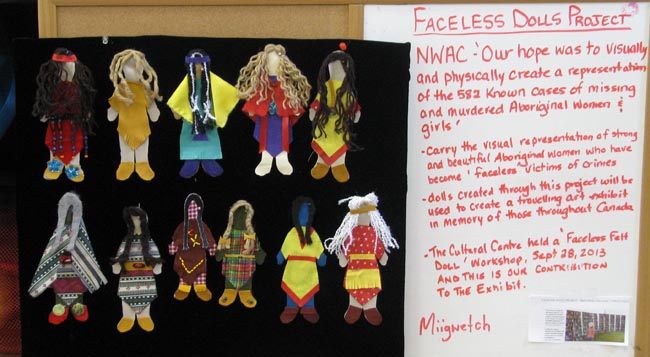
Originally published in Anishinabek News
CURVE LAKE FIRST NATION – This Saturday October 4 will mark the ninth annual Sisters in Spirit vigils, honouring the lives of missing and murdered Indigenous women in Canada.
The importance of making sure these women did not lose their lives in vain, but that some positive changes result, was stressed by both Claudette Dumont-Smith, Executive Director of the Native Women’s Association of Canada (NWAC), and Anne Taylor, Cultural Archivist for Curve Lake First Nation, in interviews for this article.
The vigils began in 2006, with 11 held in different locations across the country. Each year since, the numbers of vigils have increased, with over 200 registered in 2013, including some held internationally. The vigils are all organized locally, with NWAC playing a coordinating role.
This year in Curve Lake will mark the second annual event held in the community. For a number of years, Taylor and others travelled the 30km to Peterborough to participate in the annual vigil there. Last year Taylor and her co-worker Tracey Taylor at the Curve Lake Cultural Centre decided to host an October 4 event.
They posted an open invite for all to come and participate, and were overwhelmed when some 40 people – all women – showed up. The only male was an invited speaker, Constable Alex Zyganiuk of the Anishinabek Police, who had previously worked in the Downtown Eastside of Vancouver and was able to share stories of some of the women who’d lost their lives there.
This year the Curve Lake October 4 event is from noon until 3pm at the Cultural Centre, and there will be special guests – an international delegation of around 15 development workers who are in Canada for a large conference in Toronto earlier in the week.
The delegates were initially surprised to hear there is such a problem in Canada, but recognize a “global phenomenon” of the harmful effects of colonialism, and hope their presence at the vigil can lead to an exchange of ideas on what can be done both in Canada and elsewhere, says delegation coordinator Jennifer Brennan.
Taylor sees raising public awareness as key in addressing the problem. Visiting classes in various school boards to share Aboriginal culture, she’s found it troubling how many students and teachers are unaware of the problem.
She also thinks it is important to have a national public inquiry, as does NWAC.
“At the end of an inquiry, an indepth inquiry process, you’re going to have not only a picture of why these things are happening, but you’re going to have information on the systems that are in place but they’re not quite working, and how these systems can work to prevent the loss of lives of Aboriginal women,” says Dumont-Smith.
She feels an inquiry will result in a “very very comprehensive and very very coordinated” action plan to address the problem, and that “the Native Women’s Association of Canada, who have this expertise, must be at the forefront of the inquiry” right from the start, including in decisions on its design, its length and who will be called to testify.
With the vigils, Dumont-Smith feels that people “are keeping up with the pressure, and that’s what we need – the momentum has to be steady, and we have to continue with our efforts because this is really a problem that affects us, especially as Aboriginal people, and should affect all Canadians as well.”
For a list of Sisters in Spirit Vigils, click http://www.nwac.ca/2014-vigil-locations
 Interdependent media & in-person learning opportunities for those who are inspired to be part of movements for social justice.
Interdependent media & in-person learning opportunities for those who are inspired to be part of movements for social justice.